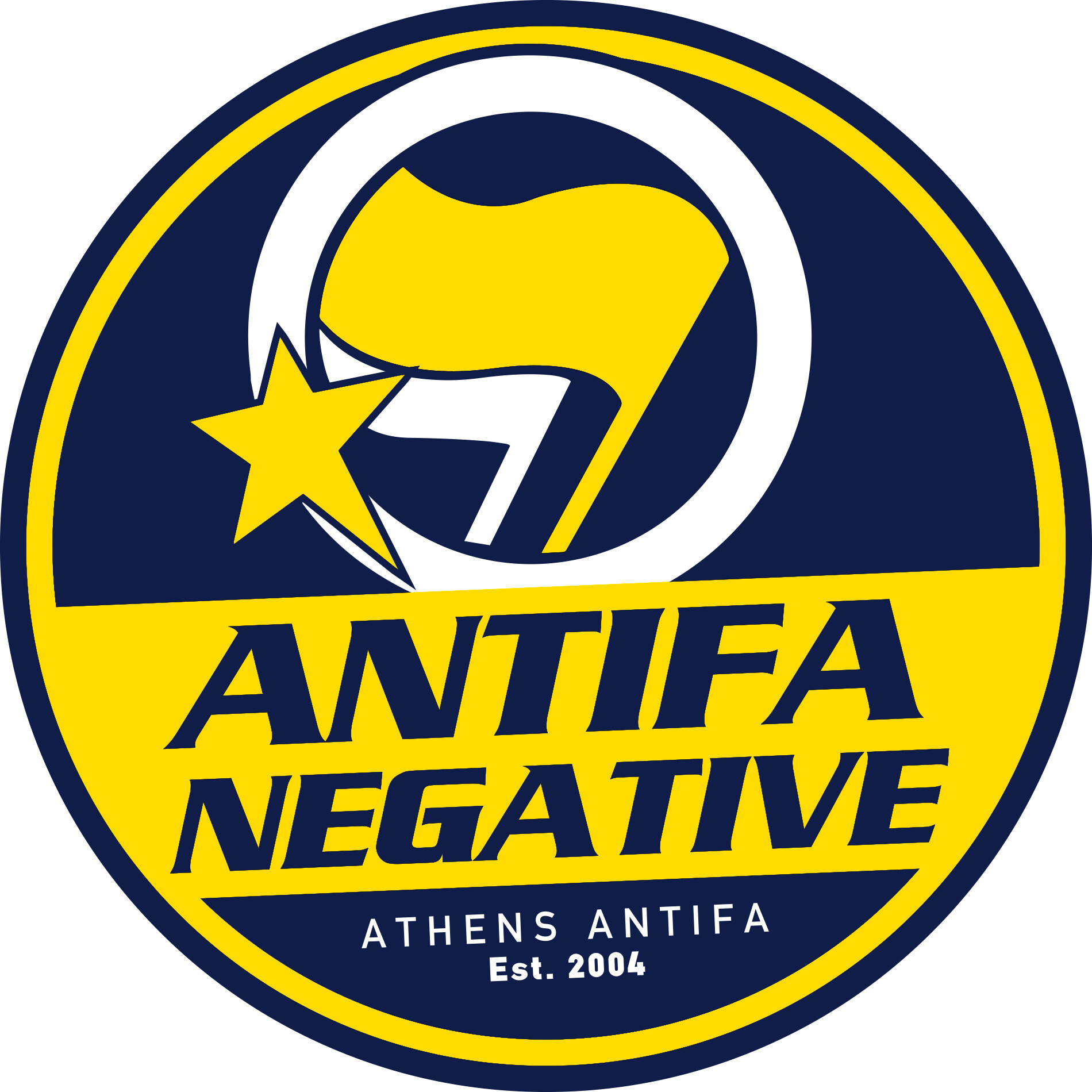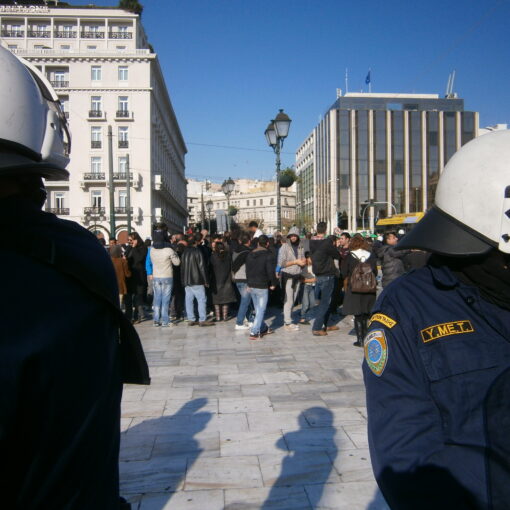A snap-shot on recent fascist activities
In the last Greek elections, in May as well as in June, the neonazi party, Golden Dawn, took 7% with half a million votes. Worse than that, 22% of the greeks state that they sympathize with the neonazi party activities. At the same time, attacking immigrants in Athens and various other greek cities has become mainstream. Let’s just note that, according to the Immigrants Workers Association, 500 attacks have taken place during the first six months of 2012. Along with all these, antisemitism and homophobia have claimed some space in the activities of the party and its followers. It should also be mentioned that many of the attacks that the IWA refers to, are committed by simple members of the … greek society – what we are used to call as “greek mob” – and not necessarily by members of the party itself. Racism and antisemitism, nationalism and homophobia were for years permanent features of greek society. However, what can connect them with a more violent turn during the last months is that by having the neonazis into the parliament, the racists became more enthusiastic and certain that their violence is nowadays, more than ever in the past, well-protected by the greek state. Of course, this is not a wrong judgement at all. The police and the judicial system back racist activities with all their means. According to ‘Vima’ (Το ΒΗΜΑ) newspaper, half of the police force of the country during the double elections of May and June, voted for Golden Dawn, that is, nearly 25.000 policemen. This condition forces immigrants – victims of racist violence – to be more reluctant to approach the authorities since they have been attacked. But even in the cases where victims of racist attacks try to sue the perpetrators in police stations, the authorities urge them to avoid legal action. Let’s just note that when the case is that a group of antifascists is getting arrested for attacking neonazis, the police response will be immediate and harsh. The greek judicial system, on the other hand, is well-known for acquitting the neonazi author Konstantinos Plevris even if he urged literally, in his book “Jews, the whole truth”, that “we should maintain Auschwitz in good condition for future use…”. Anyway, the incidents are inumerous, and only during the last month they seem to get some attention by the media outside greece. In October, Guardian and BBC made their own reportages on police brutality against immigrants and antifascists, while they reported the cases of acquittals of neonazis as a common place.1 The scenery in greece seems dreadful while resistance to fascism seems a far-out promise, at least for the time being.
Resistance and ‘resistance’ to fascism in greece
As someone may already know, the leftist scene in greece is a distinct political current from the anarchist or autonomous scene. Sometimes, as in the case of antifascist struggle, this distinction is an essential dichotomy rather than a label one. For example, it is true that in the antifascist struggle the major Leftist scene, that is, the parliamentary Left of SYRIZA (radical left party) and KKE (communist party) as well as the extra-parliamentary leftist parties are not into contributing in the antifascist struggle. The Left usually responds to fascist attacks with written condemns of racism and right-wing activism, hoping that they will isolate the fascist scene from the wider greek society. In addittion to that, the parliamentary as well as the extra-parliamentary leftist scene usually underestimate or avoid the impact and magnitude of the deep roots of racism in the greek lower social strata, that of the greek working class included. One of the solid mottos greek Leftists used to refer to, for many years, was that “we should not pay any attention to the fascists because that would end up to be a good promotion for them”. Even if that kind of logic had any basis in reality, before the elections of 2007, when the right-wing party of LAOS got its first seats in the parliament, and, well, before the elections of 2012, when the neonazis of Golden Dawn got their first ever seats too, its seems nowadays as an out-of-date practice and motto. The Left, nevertheless, not only remains steady to such beliefs but it also remains hostile to any kind of “militant/activist antifascism” on the part of antifascists in the streets of Athens and in other cities. That seems to happen because the Left does not consider militant antifascism as a primary political struggle and, mostly, gives priority to national matters or the so-called ‘crisis’. Last but not least, we should note that the Leftist scene in greece uses, in the context of its anti-IMF and crisis discourse, a certain kind of national populism as a political means and that very fact would make it even more difficult for them to differentiate themselves from the neonazis, who also use a national anti-IMF populism. This situation makes them ‘fight’ the neonazis as a pro-capitalist rather than a racist organization.
Apart from the Left, only some minorities of anarchist and autonomous groups take upon antifascist struggle by organizing demos that denounce local neonazis and try to respond politically (and both physically) in their physical agenda. Unfortunately, during these hard times in greece, the great majority of the anarchists focus on different activities, which might as well be called racist. For example, in many cases during the last year and a half, anarchists choose to attack physically (immigrant) drug-users in the neighborhood of Exarchea in order to chase them away from the area. The accusation against the drug-users is that they also sell drugs and that in this way, the police and the state try to infiltrate Exarcheia and destroy their revolutionary past… Well of course, some other autonomous and anarchist groups oppose to such demonization of the immigrant drug-users, but they remain the minority up to now.
Fighting against greek reality
We hope we have presented up to now a brief note on contemporary greek reality. And we would like to end the article by sharing some information about and analytical orientation of our group. Antifa Negative is a mixed group of people, immigrants and non-immigrants, sharing a common experience of the greek reality and a negative way of interpreting the current greek dystopias as well as the promising utopias by alternative scenes/ideologies. According to our views, we see the contemporary ‘neonazi problem’ that Greece faces as the “tip of the iceberg”, while the very greek society seems to be identified in our eyes with the iceberg itself. That means practically that neonazis fish in a sea which is convenient for their ideas since greek society is a society of well-cultivated and open racism. As soon as someone understands that condition, he or she can not take the rise of the Golden Dawn as the ‘discovery’ of racism or fascism in Greece.
Such notes on greek reality lead us to investigate further on the deep and old relations that ‘greece’ and ‘racism’, ‘fascism’ and ‘the greek state’ share. Because of the small space we have for this article, we can’t expand on that, however we have to point out the relations of fascists and the state in greece are present in many cases of the 20th century (1930-1945, 1946-1967, and so on). Nowadays, in our view, the fascists seem to step up in the mainstream politics in order to help state policies in two major directions: first of all, to control, supress and discipline the immigrants of the country, to keep them in an illegal status, with no rights, and scared to demand anything. Second, the fascists – with their nationwide groups set up after the elections of 2012 – seem to serve as a substitute force of supression against any kind of possible uncontrolled protest in the future, on behalf of the suppressed. The wide social acceptance of such groups through the country seems worrying for the time being and it reassures our belief that neither drachma nor euro, but racism, is the strongest currency in the greek context of crisis. This is one of the issues that the antifascist moverment in greece will have to respond to in an organized and well-thought way in the near future.
Because of all that, we try to direct our analysis and antifascist actions accordingly on issues of greek nationalism, racism and antisemitism, and make visible the privileges that the greek national identity offers. In this context, we try to deepen confrontations around the greek national identity, as well as to deepen the local antifascism with anti-greek elements by making clear that ‘anything greek’ is foremost a discourse and practice of homogeneity and exclusion of ‘others’, mainly immigrants and minorities of the country. Our endless and hard task, thus, is to offer, by any means, some moments of freedom for the ones excluded, and some moments of stress for the greek fascists and their many friends. We hope we gave a short but essential picture of the way we live and think of the greek reality and, by ending this article, we would like to remind to the swedish audience our slogan (a paraphrase itself of an old well-known slogan by Karl Liebknecht): “Our enemy is our very country!“
Antifa Negative, against greek experience,
October 20. 2012.
1 Some of these articles can be found here http://www.bbc.co.uk/news/world-19976841, http://www.guardian.co.uk/world/2012/oct/09/greek-antifascist-protesters-torture-police, http://www.hrw.org/news/2012/10/17/greece-needs-zero-tolerance-approach-police-violence
(An antifa negative’ s text for the swedish magazine Tidningen Brand http://tidningenbrand.se/ )


